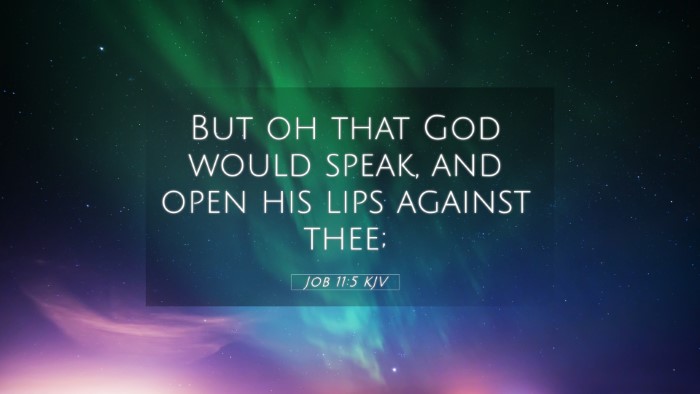Old Testament
Genesis Exodus Leviticus Numbers Deuteronomy Joshua Judges Ruth 1 Samuel 2 Samuel 1 Kings 2 Kings 1 Chronicles 2 Chronicles Ezra Nehemiah Esther Job Psalms Proverbs Ecclesiastes Song of Solomon Isaiah Jeremiah Lamentations Ezekiel Daniel Hosea Joel Amos Obadiah Jonah Micah Nahum Habakkuk Zephaniah Haggai Zechariah MalachiJob 11:5 Similar Verses
Job 11:5 Cross References
But oh that God would speak, and open his lips against thee;
Uncover the Rich Themes and Topics of This Bible Verse
Listed below are the Bible themes associated with Job 11:5. We invite you to explore each theme to gain deeper insights into the Scriptures.
Job 11:5 Cross Reference Verses
This section features a detailed cross-reference designed to enrich your understanding of the Scriptures. Below, you will find carefully selected verses that echo the themes and teachings related to Job 11:5 KJV. Click on any image to explore detailed analyses of related Bible verses and uncover deeper theological insights.

Job 33:6 (KJV) »
Behold, I am according to thy wish in God's stead: I also am formed out of the clay.

Job 40:8 (KJV) »
Wilt thou also disannul my judgment? wilt thou condemn me, that thou mayest be righteous?

Job 31:35 (KJV) »
Oh that one would hear me! behold, my desire is, that the Almighty would answer me, and that mine adversary had written a book.

Job 42:7 (KJV) »
And it was so, that after the LORD had spoken these words unto Job, the LORD said to Eliphaz the Temanite, My wrath is kindled against thee, and against thy two friends: for ye have not spoken of me the thing that is right, as my servant Job hath.
Job 11:5 Verse Analysis and Similar Verses
Understanding Job 11:5
Job 11:5 reads, “But oh, that God would speak, and open his lips against thee.” This verse is embedded in a dialogue where Zophar, one of Job’s friends, suggests that divine wisdom is profound and beyond human comprehension. Here, we explore its interpretations through public domain commentaries, highlighting various insights and cross-references.
Overview of Commentaries
This verse reveals a yearning for divine communication, as expressed by Zophar during Job's suffering. Below, we summarize insights from Matthew Henry, Albert Barnes, and Adam Clarke.
Matthew Henry’s Commentary
Matthew Henry emphasizes the importance of God's voice. He interprets Zophar's remarks as an acknowledgment that human perspectives are limited, and thus, there’s a need for divine revelation. Henry implies that the desire for God to speak directly reflects the human condition of searching for answers amid suffering. He also draws connections between God’s silence in times of distress and the reassurance of His ultimate justice.
Albert Barnes’ Notes
Albert Barnes provides additional context by suggesting that Zophar is expressing frustration over Job’s understanding of his predicament. He frames the idea that only God can offer true insight into Job’s suffering and that Job’s insistence on his righteousness might have clouded his understanding of divine judgment and counsel. Barnes also remarks on the contrast between human wisdom and divine knowledge, reinforcing the theme of humility before God.
Adam Clarke’s Commentary
Adam Clarke expands the interpretation by examining the nature of God’s wisdom as incomprehensible to man. He advocates for the belief that even in silence, God holds the power to reveal truths that mankind cannot grasp. Clarke’s reflections further connect this longing for understanding with the overall theme of the book of Job—a struggle with suffering and the quest for divine insight.
Thematic Connections and Cross-References
Job 11:5 connects with several other scriptures that explore themes of divine communication, human limitation, and the search for understanding amidst suffering. Below are notable cross-references:
- Job 37:19: Job’s desire for God’s explanation mirrors Zophar’s wish for divine instruction.
- Romans 11:33: Highlights the depth of God's wisdom, reflecting on how unsearchable His judgments are.
- Isaiah 55:8-9: Stresses the disparity between divine thoughts and human thoughts, illustrating the need for God’s revelation.
- 1 Corinthians 1:25: Emphasizes that the foolishness of God is wiser than mankind, aligning with the theme of divine wisdom.
- Psalms 37:5: Encourages trust in the Lord and the action of committing one's ways, reflecting a similar longing for guidance.
- Proverbs 3:5-6: Advises reliance on God’s understanding rather than one's own, reinforcing Zophar's message.
- Job 6:24-25: Job himself expresses a need for enlightening answers to his suffering, aligning with the themes in Job 11:5.
- Matthew 7:7: Jesus emphasizes asking and seeking, connecting the human quest for divine wisdom with Zophar’s plea.
- Job 13:23-24: Job states his desire to present his case before God, connecting to the willingness of seeking divine dialogue.
- Hebrews 4:13: Highlights that nothing is hidden from God’s sight, reinforcing the notion that divine wisdom surpasses human understanding.
Conclusion
Job 11:5 encapsulates a profound desire for divine understanding in the midst of human suffering. The commentaries expand on how this yearning aligns with the broader biblical narrative on the relationship between God’s wisdom and human experience. By exploring cross-references, we uncover a web of connections that enrich our understanding of the text, illustrating the intricate dialogue throughout scripture regarding the pursuit of wisdom and the nature of suffering.
Tools for Further Study
The study of Job 11:5 and its connections can be enhanced through various tools and methodologies:
- Bible Concordance: A reference tool that allows for finding passages related to specific words or themes.
- Bible Cross-Reference Guide: Useful for establishing connections between similar verses and enhancing understanding.
- Cross-Reference Bible Study: Engaging in comparative studies helps in digging deeper into thematic relationships.
- How to Use Bible Cross-References: Learning methods for identifying biblical connections enriches interpretation.
- Bible Chain References: This technique links verses to construct a narrative or thematic thread.





